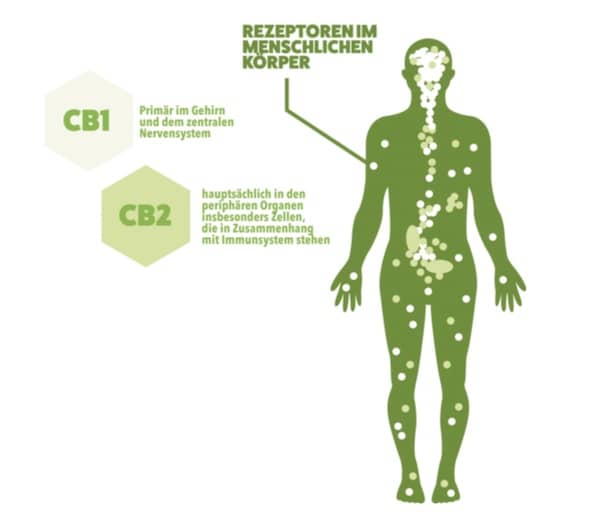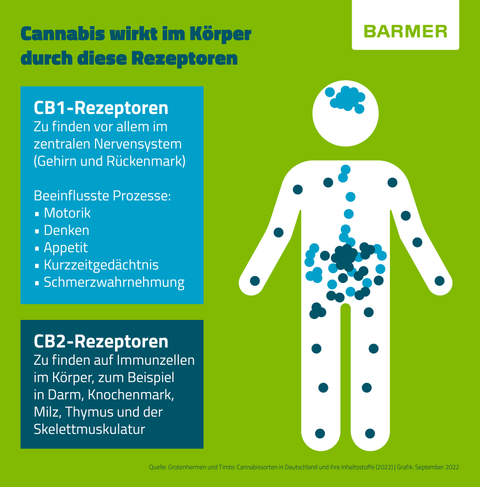Cannabidiol, also known as CBD, has attracted a lot of attention in recent years. Many people swear by the positive effects it has on their bodies and health. But what does CBD actually do in the body?
CBD is a non-psychoactive cannabinoid derived from the hemp plant. It interacts with the body's endocannabinoid system and can thus develop various positive effects. In this article, we're going to take a closer look at the effects of CBD on the body and how it can help us lead healthier lives.
CBD acts on the body by activating the body's endocannabinoid system. This system regulates many functions in the body such as pain, appetite, mood and sleep. CBD can also reduce inflammation and anxiety, as well as relieve the symptoms of epilepsy and Parkinson's. It has no psychoactive effects and is therefore non-intoxicating.

What does CBD do in the body?
1. What is CBD?
CBD is short for cannabidiol, one of the 100+ cannabinoids found in the hemp plant. Unlike THC, which has psychoactive effects, CBD is not high or addictive. It is legal and sold in different forms like oil, capsules or cream.
CBD interacts with the body's endocannabinoid system, which plays an important role in regulating various bodily functions. It can also interact with other systems such as the serotonin or adenosine systems.
2. Anti-inflammatory effect
CBD has an anti-inflammatory effect in the body. It can help reduce pain and inflammation by acting on certain receptors in the body. One study found that CBD may be effective in treating chronic pain such as that associated with arthritis.
Another study suggests that CBD may help treat inflammatory bowel diseases like Crohn's disease. It can also help treat acne as it has anti-inflammatory properties.
3. Stress Reduction and Anxiety Relief
CBD can also help reduce stress and anxiety. It can inhibit the release of stress hormones in the body and increase prefrontal cortex activity, which can lead to calming and relaxation.
One study found that CBD may be effective in treating anxiety such as occurs with post-traumatic stress disorder. It can also help treat insomnia as it has sedative properties.
4. Neuroprotective effect
CBD also has neuroprotective effects in the body. It can protect brain cells from damage caused by oxidative stress or inflammation. One study found that CBD may be effective in treating neurological conditions like epilepsy.
Another study suggests that CBD may help treat Alzheimer's and Parkinson's because it can inhibit plaque formation in the brain.
5. Improving heart health
CBD may also help improve heart health by lowering blood pressure and reducing inflammation in the body. One study found that CBD may be effective in treating high blood pressure.
Another study suggests that CBD can help treat cardiovascular diseases like stroke or heart attack by reducing damage to the heart and brain cells.
6. Treatment of addictions
CBD can also help treat addictions like alcoholism or substance abuse by affecting the reward centers in the brain. One study found that CBD may be effective in treating nicotine addiction by reducing cigarette cravings.
7. Possible side effects
Although CBD is considered safe, it can cause side effects in some people, such as fatigue, diarrhea, or nausea. It can also affect the effects of certain medications, so it's important to consult a doctor before taking CBD.
8. CBD vs. THC
CBD and THC are both cannabinoids, but they have different effects in the body. THC has psychoactive effects and can get you high, while CBD has no psychoactive effects and won't get you high. THC is also illegal in many countries, while CBD is legal.
9. How to take CBD
CBD can be taken in different forms such as oil, capsules or creams. It can also be mixed into food or drinks. The dosage depends on various factors, such as body weight, the severity of the condition and the desired effect.
10. Conclusion
CBD has many positive effects on the body, such as reducing inflammation and stress, improving heart health, and treating neurological disorders or addictions. It is safe and legal and can be taken in various forms. However, if you want to take CBD, you should consult a doctor beforehand, especially if you are already on medication.
frequently asked Questions
Here are the answers to the five most common questions about how CBD works in the body.
What is CBD?
CBD is an acronym for cannabidiol, an active ingredient extracted from the hemp plant. It is one of many cannabinoids found in the plant. Unlike THC, CBD has no psychoactive effects and does not make you “high”.
CBD is believed to have a variety of health benefits, including relieving pain, inflammation, anxiety, and depression.
How does CBD work in the body?
CBD interacts with the body's endocannabinoid system, which plays an important role in regulating appetite, mood, sleep, and pain perception. CBD binds to cannabinoid receptors in the body and can thus enhance the effects of natural endocannabinoids.
CBD is also thought to increase the production of serotonin, a neurotransmitter that plays an important role in regulating mood, sleep, and appetite.
What are the health benefits of CBD?
There are many potential health benefits of CBD, including relieving pain, inflammation, anxiety, and depression. It is also investigating whether CBD may play a role in treating epilepsy, cancer, and other conditions.
It is important to note that more research is needed to confirm and understand the health benefits of CBD.
How is CBD used?
There are many ways to consume CBD, including ingesting CBD oil, using products containing CBD such as lotions or creams, inhaling CBD via e-cigarettes or vaporizers, and taking CBD capsules or tablets.
It is important to follow the manufacturer's dosage recommendations and to exercise caution when using CBD, especially if you are taking other medications.
What side effects does CBD have?
Although CBD is generally considered safe, some people may experience side effects, including drowsiness, nausea, diarrhea, and loss of appetite. It's important to speak to a doctor before taking CBD, especially if you're on other medications or pregnant.
It's also important to make sure the CBD product you use is of high quality and free of harmful contaminants.

In summary, CBD can have a variety of positive effects on the body. It can relieve pain, reduce inflammation, and relieve stress. CBD can also help improve sleep and has the potential to boost the immune system.
However, it is important to note that CBD is not suitable for everyone and that there are potential side effects. It is advisable to consult a doctor before taking CBD.
Overall, CBD is a promising remedy that can help with many ailments. However, it is important to use it responsibly and to be well informed about the possible effects.


